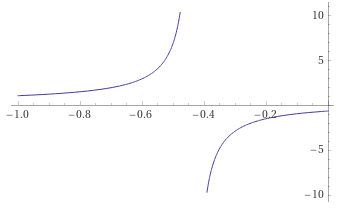I am trying to solve a discontinuous ODE using the lsode solver. I tried setting the t_crit parameter to specify the time where the discontinuity is present, but it didn't help.
The analytical solution of the ODE looks like the following, where the discontinuity appears at $t = -0.433$, which is the value I set to the t_crit parameter of lsode. Is there any strategy to tackle this kind of situations with lsode?
Please note that I am restricted to using lsode as the solver.
